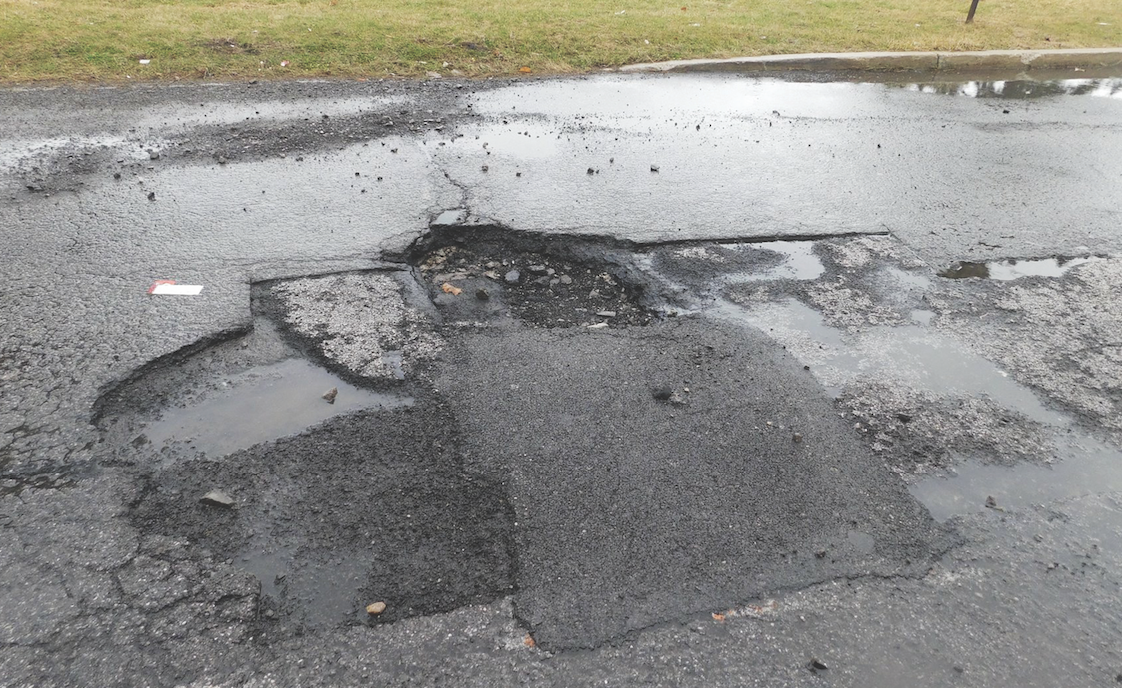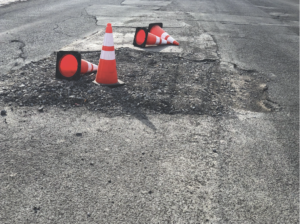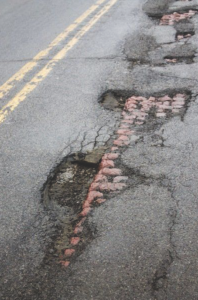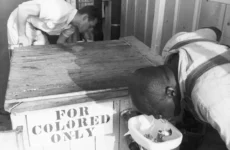Please click the link below to subscribe to a FREE PDF version of each print edition of the Niagara Reporter
http://eepurl.com/dnsYM9
Niagara Falls reduces infrastructure spending in wake of casino payments stopping.
By: Nicholas D. D’Angelo
Analysis
After a rough winter, spring is often a difficult time to find smooth roads in the City of Niagara Falls.
Normally the City does an adequate job of repairing the problem areas and paving the roads most in-need of replacement by the summer’s end.
2018, unfortunately, is not going to be a normal year.
Mayor Paul Dyster recently released that the City of Niagara Falls plans to pave 15 streets in 2018, which would use $1.8 million in state aid.
However, and as Mayor Dyster noted, it would have been “twice as many roads” had the casino money come in.
This announcement comes after an announcement in the beginning of April that the city’s “pothole killer” would be delayed in hitting the streets as well.
“We instituted a spending freeze on all non-essential expenditures to try to hold on to cash through 2017 and we continue that into 2018,” said Mayor Dyster.
“There are going to be some significant impacts and I think some of them are, as the weather warms, people are going to notice in their neighborhood.”
The City of Niagara Falls has not received any revenue from the Seneca Nation in 2018.
The dispute is currently in arbitration.
“They’re still searching for a third arbiter, but who knows how long that will take or who the arbiter is going to decide is right,” said Councilman Chris Voccio.
In 2017, when Niagara Falls received $16 million in casino revenue, $11 million and change of which went toward the 2018 budget deficit.
“There is approximately $11.2 million of casino funds being used as a revenue in the City’s 2018 budget,” said Councilman Ezra Scott. “I am not saying that we cannot use casino funds as a revenue in our budget – this does help with property tax relief – however, I feel $11.2 million is a very large amount especially when the City only received a total amount of $16.7 million from its 2016 local share.”
“It is a great disservice to our residents to not be able to provide essential services, especially with what they have to pay in property tax to live here.”
At their meeting on April 11th, 2018, the Niagara Falls City Council put in place a “Casino Spending Policy.”
The policy including holding back 5% of any revenue in a “reserve fund” and splitting the remaining monies to everything else (i.e.: paying off debt, infrastructure, economic development, and etc.).
However, the policy is meaningless unless the City of Niagara Falls receives any future payments from the Seneca Nation.
As for a plan/policy in the event Niagara Falls never sees another dime from the Seneca Nation? City Council Chairman Andrew Touma said, “we’re not sure.”
“Everything’s on the table at this point,” he said. “That means [looking at] possible additional revenue sources and could possibly mean cuts through attrition.”
While city officials sort out their plan for possible future payments by the Seneca Nation, Niagara Falls residents continue to feel the ill effects.
“I’m not happy that we are doing so few roads this year,” said Councilman Tompkins.
“The citizens deserve better than this,” continued Tompkins. “Since we aren’t getting casino revenue due to the dispute with the Senecas, I would have expected that our mayor would have, at a minimum, thought outside the box asked the Seneca Nation to enter in a separate agreement for the police and fire protection that we provide! Even if we can’t negotiate terms for revenue sharing, I have been told by lawyers that discussing compensation for police and fire protection would be permissible.”
“Instead of hammering away at Governor Cuomo and being on TV every week, our mayor stands idly by watching and points his finger at anyone other than himself for who to blame.”
“We need to get creative. We need to ask for a cut of parking at State Parks or get compensated for the value of the Seneca’s land. Everything is on table. This city can’t keep taking away from the residents who continue to be this administration’s top choice to shoulder all the burden.”
“It’s unfortunate that our roads are in such a state of disrepair,” said Councilman Chris Voccio.
“If casino revenues in the past had been dedicated to enduring items like infrastructure and economic development, our roads would be in better shape. Our budget has become so weighted towards personnel expenses, around 80% of it, that there’s little left over to use for roads. We need to right-size government and re-set our priorities.”
“Niagara Falls is a major tourist destination where people come for all over the world,” said Councilman Scott. “Tourism is a major industry here and what kind of impression do we want to leave on our visitors if the condition of our roads, and other enhancements where casino funds were used, are not kept up?”
“For the City to become self-sustaining again, the current administration needs to have in place right now a five to seven year financial plan,” said Scott. The goals and objectives in the plan should be realistic and attainable and not something that just looks good paper.”
“This financial plan must show how City officials plan on decreasing the amount of casino fund revenue being used to balance the City budget without placing a burden on property taxes and making sure we provide the essential services.”
Councilman Scott couldn’t have summed it up any better, stating, “the real loser here is our residents.”























